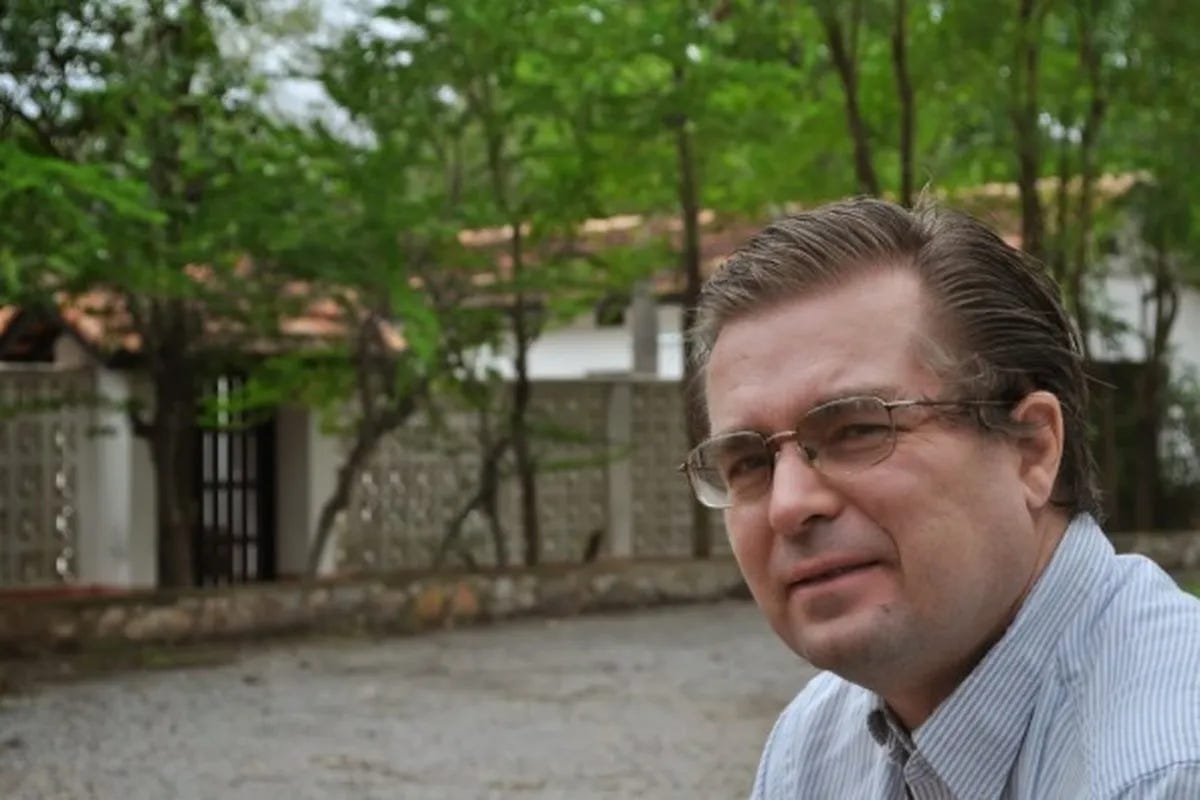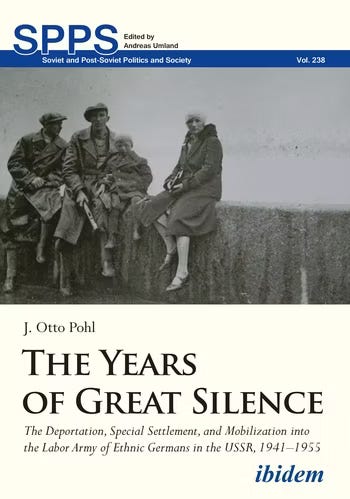Book Review: "The Years of Great Silence" by J. Otto Pohl
Dr. Pohl offers us a critically important study of one of the most underdiscussed and poorly understood events of the 20th century
Please support me by purchasing my new book! If you purchased a copy of “Intolerant Interpretations” then please leave a strong review on Amazon.
The taboo against German history
It is a challenge, for sure, to resist feeling that the 20th century is the most lied about period within human history. While I don’t believe that to truly be the case, the very recent past has nevertheless produced much controversial material for examination (and even more controversial interpretations).
Capturing the meaning of a given event (or series of events) is no easy matter, even more so when one considers the political ramifications wrought for attempting the feat. Certainly, nobody expects perfectly comprehensive depth and detail from a popular author (due to the conditions of mass market literature), but the promulgation of fallacious interpretations, however, proffered by popular and academic historians alike demonstrates just how badly the field has succumbed to that dreaded partisan slant which has so crippled the humanities. As bad as this all sounds, matters have only worsened: it has become increasingly difficult to find reliable scholars of even the most well-known historical circumstances. The result of this crisis? Over the course of the last century, history has become a weapon waged in defense of the post-war consensus – a weapon waged against us.
Even though the preceding century suffers no shortage of controversial moments, some subjects are so taboo, so dangerous to a standing regime, that they don’t even get propagandized – they are simply ignored. For instance, while the mid-century German regime is heavily propagandized against to prevent the truth of its nature from ever becoming common knowledge, the criminal mistreatment of ethnically German Russians by the Stalin regime during and immediately following the Second World War, on the other hand, is hardly even up for discussion.
Speaking for myself, I was at best dimly aware of the Soviet program committed against its ethnic German population and only came to a fuller understanding of the matter thanks to Dr. Pohl’s work. But I would never have even found Dr. Pohl’s work had I not turned to one of the most censored corners of the internet to further my education. Such is the reach of the contemporary taboo against German history.
In today’s world, the German people may only be known as sadists and psychopaths (that is, if we are ever to explain Germany’s collective conduct throughout the 20th century); or, alternatively, they may be known as timid, self-extinguishing rule followers (so that we may explain Germany’s collective conduct so far throughout this century). Whichever historical interpretation of the German people we are permitted to entertain, it is of the utmost importance to recognize that all are offered to maintain the political taboo against a holistic and factual German history.
But these are not the only ways of understanding the German people, just as the circumstances surrounding the NSDAP were not the only meaningful events affecting 20th century Germans. There were, also, the years of great silence.
A good historian is hard to find
Dr. Pohl is a historian and author of several books, all of which focus on the middle period of the Soviet regime (which is to say, the Stalinist years). In fact, Dr. Pohl may very well be one of the world’s foremost experts on the matter (and if not, he is certainly one of the most intellectually honest and rigorous historians to have taken up the subject). Dr. Pohl’s latest work, The Years of Great Silence is a critically important work: a study on the history of the Volga Germans. Dr. Pohl begins with the overtures made to the would-be Russians by Catherine the Great (herself an ethnic German) and ends with their persecution – and eventual dissolution – at the hands of Joseph Stalin.
Immaculately researched using primary sources, Pohl details the excruciating ethnic cleansing which saw far too many German Russian men, women, and children forcibly relocated to impoverished and resource-poor regions like Kazakhstan and Siberia. Understand that this was no mere logistical oversight: as Dr. Pohl demonstrates by reviewing original documentation, the Soviet regime knew that by mobilizing this population it was effectively consigning many of them to their deaths. An essential read from cover to cover, I found the chapter which highlighted Stalin’s forced conscription of the Volga Germans into the labor army (the longest and perhaps most damning chapter of the entire book) of particular interest.
When historians and academics demonstrate the willingness and courage to criticize Stalin’s USSR, they often do so by decrying his totalitarianism, his police state, and particularly his treatment of the Russian Jewish population. For reasons already stated above, there is hardly – if ever – mention of the Volga Germans. Pohl’s book accomplishes much by shining a light on their persecution. I can’t stress enough the dedication and commitment Pohl demonstrates in accurately documenting Stalin’s mobilization program. Not only should his technical acumen be commended, but so too his brisk and easy tone (particularly for such troubling subject matter).
I could say more but perhaps the best way to highlight the importance of this work is by quoting Dr. Pohl himself. Taken from the final chapter, Dr. Pohl declares:
“The Years of Great Silence for the Germans in the USSR between 1941 and 1955 have received little attention in the US and other English speaking countries. Against the back drop of the Second World War, the fate of a million and a half people ethnically and culturally related to the primary nemesis of the US, UK, and USSR during the 1940s has been treated as an inconvenient detail. While the subject has received much more scholarly and popular attention in Russia, Ukraine, Kazakhstan, Central Asia, and Germany since the breakup of the USSR, it has remained not only largely ignored, but semi-taboo in the US. It is not just that the sources are largely in Russian and to a lesser extent German. But, rather the US and UK are still immersed in their own Years of Great Silence regarding much of World War II. In particular, addressing any Allied including Soviet crimes during the war and immediately afterwards against ethnic Germans remains strongly discouraged and overshadowed by a mythic construction of the war in which all Germans are demonically evil and their political and military enemies morally infallible. Given this predominant popular myth even research into the fate of the much larger and in many ways easier to research groups of Germans expelled from eastern Germany, Poland, and Czechoslovakia has remained extremely limited in the English speaking world. The fate of the smaller groups of Germans that remained trapped behind the Iron Curtain thus has received very scant attention in the English language literature. It is my hope that this short book will partially ameliorate this general lack of attention.
The Germans in the Soviet Union were the largest of a number of national groups subjected to ethnic cleansing by the Stalin regime during World War II. They constituted nearly half of all the people deported as special settlers by the NKVD from western regions of the USSR to Siberia, Kazakhstan, and Central Asia during the war. The 1941 erasure of 177 years of German settlement from the Volga region also preceded the ethnic cleansing of the Karachais, Kalmyks, Chechens, Ingush, Balkars, Crimean Tatars, and Meskhetian Turks by over two years. It thus sticks out as the largest of a series of ethnically motivated crimes by the Soviet government during the war.
The losses and trauma suffered by the Germans in the USSR from 1941 to 1955 greatly altered their historical path of development. It geographically scattered them across Siberia and Kazakhstan and greatly accelerated their acculturation into a much larger
Soviet Russian culture. Hopes of creating a distinct Soviet German speaking nation in the Volga German ASSR were permanently destroyed by the forced dispersal of its population from this area of compact settlement. The deportations also psychologically marked them as being part of a single outsider group defined by biological descent from German colonists and laid the foundations for the massive emigration out of the former Soviet states in the 1990s. The fourteen Years of Great Silence formed the nadir of the historical narrative of the Russian Germans as an ethno-national group.
The deportations, special settlement restrictions, and mobilization into the labor army, however, only form a part of the historical narrative of the Russian Germans and it would be wrong to view their entire history from 1763 to today solely through this
lens. Instead the narrative arc as a whole should be viewed as having several stages. These are an initial heroic narrative of the original settlement and economic success, followed by the victim narrative of the years of Soviet repression, and ending with a redemption narrative on overcoming the Years of Great Silence. This book has focused on the middle victim part to the neglect of the first and third parts. There has been a considerable amount of research published on the first part of this narrative not only in Russian and German, but even in English. The third and perhaps most important part of the narrative still largely remains to be written in any language.”
To purchase Dr. Pohl’s book, see the following links:
Columbia U. Press for the US and Canada
https://cup.columbia.edu/book/the-years-of-great-silence/9783838216300
Amazon
https://www.amazon.com/Years-Great-Silence-Deportation-Mobilization/dp/383821630X
Ibidem Verlag for the EU







What a pity (and somehow ironic) that the only method to purchase this book in Europe appears to require a PayPal account, a no-no for anyone currently opposing the oligarchic regimes. Sorry.